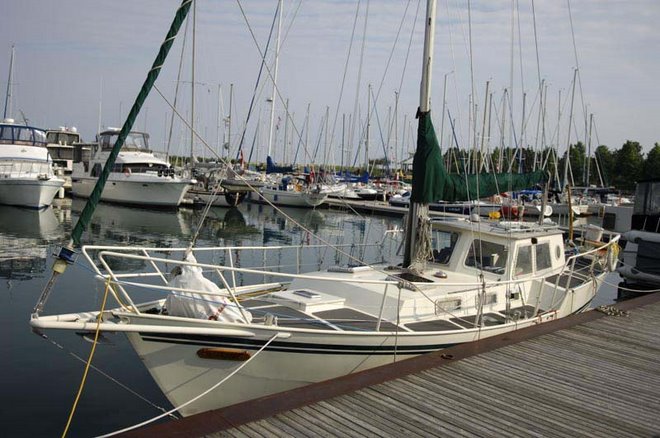 |
| Unless one is moving house, you can never have enough spares. OR CAN YOU? |
Decommissioning possessions, however, is tricky. We are moving in stages: we will attempt to rent an apartment or condo locally so our son can finish school and I can continue unimpeded (save by my own levels of competency) to make Alchemy livable. I am loth to sell off or reallocate tools, but the facts are stark: I have a lot of duplication between the boat and the garage, because I haven't been keen, for instance, on lugging entire socket sets back and forth. Ever dropped a socket set while descending a boat ladder...in winter? I have. Two hundred bucks to avoid it by buying a second set for the mancave seems cheap.
Now, the process of selling boat gear is complex due to the valuation. A 40-year-old carb for an engine that hasn't been made since Pierre Trudeau was last prime minister is either junk or gold, depending on who needs it. But Lake Ontario still has a few thousand of these engines in equally venerable, freshwater-only boats: it would be stupid to repower most of them with modern diesels when the gas inboard is still reliable. So the trick is to put out the word and to be flexible on price. My fellow boaters are resigned to certain levels of expense involving the word "marine" (as, alas, am I), but everyone likes a bargain. Price to move unless you want to carry it to the next shack. I have a friend who does vintage car parts for a living and is basically in "continuous auction mode" for the very limited number of people on Earth who need the obscure things he sells. He says I should sell and keep selling. I think he's got a point.
Boats are finite in carrying capacity, although we have, with a steel full keeler, more stowage than most. Every kilo carried, however, slows the vessel down if only by a tiny fraction; every metal object on board is a potential projectile if not secured and a locus of rust if not protected. Unless one sails in a TARDIS, one must choose wisely which spares and tools to bring. Equally true is that most boaters should review what they've hoarded, or scavenged, or bought and never used, or used once and never again, and critically think if it would be better in the hands of others than on a blockaded shelf in the garage. Or in a sail bag hooked to the ceiling. Rum's not getting cheaper, after all, nor are boat interiors getting bigger.
 |
| Speaking of which, this genuine CQR is for sale. |
 |
| As is this 27 lbs. "Kingston" CQR knock-off. Drop me a line. |
So, the garage mining proceeds. Interestingly, the buyer of the first lot has a number of boat restoration and fixing projects on the go, and already knew of me as a long-time reader of the blog. He knew I was moving, for instance. While this isn't the first time I've met in real life blog followers, and with the number of "hits" approaching one-quarter million, odds are good I'll continue to do so, it's still a touch disconcerting. When we actually depart, I will rejig the blog and add a great deal more visual content as we start going to interesting places; perhaps by that point, I will be more accustomed to having strangers know things about me because I've posted them online...I am more surprised than I should be, I suppose.
And by way of the rather obscure post title, my family is watching 20-year-old episodes of Star Trek: Deep Space Nine on DVD. Our son, who is 16, hasn't seen them and is enjoying them; we've half-forgotten many episodes and are equally entertained. The one we saw last night was this one, and "the great material continuum" referred to a mercantilist philosophy of having discrepancies between having and wanting, i.e., the basis of commerce. Besides, as a person who went to his first Star Trek convention as a teenager in the 1970s, any excuse to wed Trek and sailing will do.




No comments:
Post a Comment